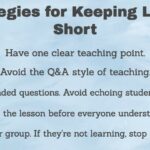“What about kids who just don’t care?”
When I’m supporting teachers in schools, either around classroom management and discipline or academic engagement and motivation, this is a question that often comes up.
We all know these kids, don’t we? They
Classroom management and academic engagement are two of the most important aspects of getting off to a great start in the new school year. Though gem/marble jars, tickets, clip charts, and other incentive systems (including traditional grades) are common throughout
A friend and colleague of mine, Andy Dousis, once told me that every lesson has three moments: a golden one, a silver one, and a leaden one. Whatever you say in the first 60 seconds of the lesson is the
Walk through most schools, and you’ll see messages like the ones above, posted in classrooms and in hallways. We often encourage kids, as they’re about to work to “try your best” or “put in max effort.” One year in
What did the mathematical acorn say when he grew up?
“Ge-om-e-try!” (“Gee, I’m a tree!”)
Ah—dad jokes. Silly plays on words. Puns. Cornball humor. Eye-rollers. Groaners.
Ted Lasso is packed with goofy humor. Have you noticed how this keeps your
Do your students seem young this year? You’re not alone. In every single school I’m working in this year—with no exceptions—teachers are saying the same kinds of things.
This shouldn’t be surprising. Students always seem a bit young in the
Teacher language can be a great focus for a New Year’s resolution. After all, we all use language with students, and we all surely have some habits that could use some refinement. Often, some of our language habits don’t line
I was delighted to join a group of deep thinkers for an in-depth panel discussion about leaner-centered education. Hosted by Julie Mountcastle of the Slate School, this conversation is rich and engaging. You’ll hear about the importance of cherishing children’s
Are incentive systems used in your school? Do kids get handed tickets or fake money (to be spent at the school store) for walking quietly in hallways? Are gem and marble jars used to motivate kids to raise their hands
What do you think–should teachers call students “friends”?
Educators at William H. Rowe School in Yarmouth, Maine are engaged in an exploration of teacher-talk. They’re using What We Say and How We Say It Matter: Teacher
If you teach reading and/or writing, there’s a good chance that when introducing a new concept or skill, you begin your lesson by saying some variation of, “Good readers….”
“Good readers pay attention to context clues.”
“Good writers add








